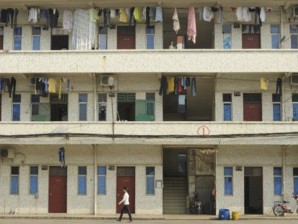China’s city dwellers overtake rural population
BEIJING—China said Tuesday the number of people living in cities exceeded the rural population for the first time, a development experts warned was likely to put strain on society and the environment.

A view of Chinese migrant worker's accommodation in the southern Chinese city of Shenzhen. China's migrant workers, who have powered growth with cheap labor, are now seeking higher pay and better conditions. AFP
The shift marks a turning point for China, which for centuries has been a mainly agrarian nation, but which has witnessed a huge population shift to cities over the past three decades as people seek to benefit from the nation’s economic growth.
Urban dwellers now represent 51.27 percent of China’s entire population of nearly 1.35 billion — or 690.8 million people — the National Bureau of Statistics (NBS) said.
It added that China had an extra 21 million people living in cities by the end of 2011 compared to a year earlier — more than the entire population of Sri Lanka — while the number of rural dwellers dropped.
“Urbanization is an irreversible process and in the next 20 years, China’s urban population will reach 75 percent of the total population,” said Li Jianmin, head of the Institute of Population and Development Research at Nankai University.
“This will have a huge impact on China’s environment, and on social and economic development.”
A significant portion of China’s urban dwellers are migrant workers — rural residents seeking work in towns and cities — who have helped fuel growth in the world’s second-largest economy.
A national census published in April last year showed China counted more than 221 million migrants, and a government report released months later predicted that more than 100 million farmers would move to cities by 2020.
Migrants are often treated as second-class citizens in the towns or cities they live in, as they are still registered as rural residents and have little or no social security.
Many migrant workers — especially the younger, so-called second generation — are increasingly frustrated with the treatment they receive, and the issue has in some cases sparked violent unrest.
In June last year, three days of riots broke out in the southern province of Guangdong after rumors spread that police had beaten a street hawker to death and manhandled his pregnant wife.
Li said the rising number of urban dwellers would put a strain on resources as new or expanded cities would have to be built, adding that different urban centers had adopted different attitudes towards the issue.
“Big cities such as Beijing and Shanghai have already clearly stated they want to contain the population increase,” he said.
They “have implemented a number of measures that are necessary as it is a severe test for local resources and traffic.”
But he said some small and medium-sized cities were still actively encouraging the rural population to become urbanites, which put a strain on resources and could pollute the local environment.














